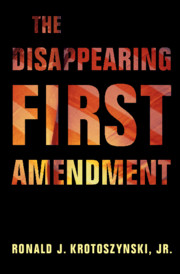Book contents
- The Disappearing First Amendment
- The Disappearing First Amendment
- Copyright page
- Dedication
- Contents
- Preface
- Acknowledgments
- Table of Cases
- 1 Two Steps Forward, One Step Back
- 2 The Public Forum Doctrine and Reduced Access to Government Property for Speech Activity
- 3 The First Amendment As a Source of Positive Rights
- 4 Whistleblowing Speech and Democratic Accountability
- 5 Shedding Their Constitutional Rights at the Schoolhouse Gate
- 6 Transborder Speech
- 7 Systemic Failures to Protect Newsgathering Activities by Professional Journalists and Amateur Citizen-Journalists Alike
- 8 The Citizen As Government Sock Puppet and the State Masquerading As a Citizen
- 9 Using Constitutionally Permissible Statutes to Impede First Amendment Activity
- 10 Conclusion
- Notes
- Index
9 - Using Constitutionally Permissible Statutes to Impede First Amendment Activity
The Supreme Court’s Failure to Address the Abuse of Discretionary Authority by Police, Prosecutors, and Other Nonjudicial Actors
Published online by Cambridge University Press: 02 August 2019
- The Disappearing First Amendment
- The Disappearing First Amendment
- Copyright page
- Dedication
- Contents
- Preface
- Acknowledgments
- Table of Cases
- 1 Two Steps Forward, One Step Back
- 2 The Public Forum Doctrine and Reduced Access to Government Property for Speech Activity
- 3 The First Amendment As a Source of Positive Rights
- 4 Whistleblowing Speech and Democratic Accountability
- 5 Shedding Their Constitutional Rights at the Schoolhouse Gate
- 6 Transborder Speech
- 7 Systemic Failures to Protect Newsgathering Activities by Professional Journalists and Amateur Citizen-Journalists Alike
- 8 The Citizen As Government Sock Puppet and the State Masquerading As a Citizen
- 9 Using Constitutionally Permissible Statutes to Impede First Amendment Activity
- 10 Conclusion
- Notes
- Index
Summary
This chapter considers the impact of nonjudicial actors in defining and limiting the scope of First Amendment rights. The protection of First Amendment rights cannot be solely the province of the federal courts; non-judicial actors have an important role to play in securing expressive freedoms and facilitating the operation of the political marketplace of ideas. Police, prosecutors, and other public officials who exercise discretionary authority can use their discretion either to facilitate or impede the exercise of First Amendment rights.1 The misuse of discretionary policing authority can profoundly affect the ability of ordinary citizens to gather in public spaces for the purpose of exercising their rights of speech, assembly, association, and petition – rights that remain highly salient even in the age of the internet.2 As Professor Tabatha Abu El-Haj has argued, “[o]utdoor assembly has unique attributes as a form of political participation, even in the twenty-first century.”3
Thus, non-judicial actors play an important role in determining the scope of protected speech rights. When police officers and prosecutors arrest and charge protesters, then drop charges that seem questionable on First Amendment grounds, the damage to First Amendment values remains.
- Type
- Chapter
- Information
- The Disappearing First Amendment , pp. 194 - 214Publisher: Cambridge University PressPrint publication year: 2019



